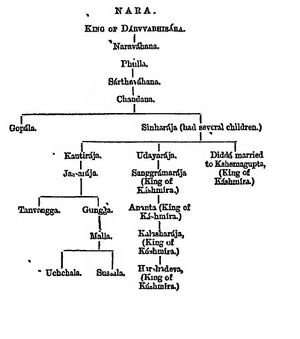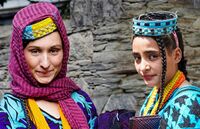Kalash
Kalash (कलश)[1] Kalash (कालाश) is a gotra of Jats.[2] Kalasha clan is found in Afghanistan. [3]
Origin
They get name after Nagavanshi mahapurusha Kalasha (कलश). [4]. Ranaditya II alias Kalasha was king of Lohara dynasty in Kashmir from 1063-1089 AD.[5]
Kalasharaja in the Genealogy of Nara
Rajatarangini[6] provides us following Genealogy of Nara:

Formerly at Darvvabhisara there lived a king named Nara of the Gotra of Bharadvaja, who had a son named Naravahana, and Naravahana had a son named Phulla. Phulla had a son named Sarthavahana, his son was Chandana, and Chandana had two sons, Gopala and Sinharaja, Sinharaja had several children, his daughter Didda was married to Kshemagupta. Didda made Sanggramaraja (son of her brother Udayaraja) king. She had another brother, Kantiraja, and he had a son named Jassaraja, Sanggramaraja had a son named Ananta, while of Jassaraja were born Tanvangga and Gungga. Ananta's son was Kalasharaja, and of Gungga was born Malla. Kalasha's son is king Harshadeva, and Malla's sons were Uchchala and Sussala.
In Mahabharata
Udyoga Parva/Mahabharata Book V Chapter 103 mentions Names of famous Nagas of Bhogavati:
- आर्यकॊ नन्दकश चैव तथा कलशपॊतकौ
- कैलासकः पिञ्जरकॊ नागश चैरावतस तथा Mahabharata (V.103.11)
History
H.A. Rose[7] writes that Kalash (कालाश), a tribe of Kafirs, long subject to Chitral and found in two small villages, Kalashgum and Bidir of that State. They speak the Kalash language and are Faqir Miskin by status. The Kam Kafirs affirm that the whole of the country from the Eastern Kafiristan frontier as far as Gilgit was once inhabited by the Kalach.
Rajatarangini[8] mentions Kalasharaja, a principal Thakkura of Rajapuri, who was bribed by king Harsha of Kashmir for his support, during rein of Harsha of Kashmir.
Rajatarangini[9] mentions that Bhagika, Sharadbhasi, Mummuni, Mungata, Kalasha and other men of the king's party harassed the enemies. Kamalaya, son of Lavaraja king of Takka, took the king's side in this war in 1121 AD.
Calas in Greek History
See Calas: Greek Commander of Alexander in 335 BC
The Kalash tribe of Pakistan

The people of the Kalash tribe, who live in the Chitral district of Pakistan, believe they are descendants of Alexander the Great’s troops who settled in the area about 23 centuries ago. Numbering only about 4,000, their unique culture is in danger of extinction.
The Kalash are a small ethnic and religious community with many characteristics which distinguish them from the surrounding population. Many of the Kalash are fair-skinned and blue or green-eyed, and these features contribute to the age-old legend that they are indeed descendants of Greek soldiers who fought with Alexander the Great in Pakistan around the year 300 B.C.
Surrounded by Muslim communities, the Kalash have nevertheless kept their ancient customs and practices. They are polytheists who worship many gods, much like the ancient Greeks, and nature plays an important and spiritual role in their daily life.
As part of their religious tradition, animal sacrifices are offered and festivals are held to give thanks for the abundant resources of their three valleys.
Their polytheism, mythology and folklore have all been compared to that of the ancient Greeks. Yet in reality they are much closer to Indo-Iranian (pre-Zoroastrian-Vedic) traditions.
The Kalash celebrate three festivals in a year which have become a tourist attraction in the region. During the festivals, the Kalash drink homemade wine and dance to the sound of drums — activities that are strictly forbidden to Muslims.
Also, unlike Muslim women, Kalash women are not only allowed to choose their own husbands, but they can also divorce them and are even allowed to elope. Kalash tribe and traditions in danger of extinction
Yet, despite all the differences with their Muslim neighbors, the Kalash are in danger of being absorbed by them. Their traditions are quickly becoming extinct, as many convert to Islam.
In the 19th and early 20th centuries, many Kalash were converted to Islam by force. Even today, there are media reports of forced conversions and forced marriages with non-Kalash people.
In addition, modern culture is catching up with the newest generation, and Kalash culture is being eroded from within. Young people are adapting to new and modern ways. Many who desired to obtain a formal education and enjoy modern careers have left the region to work in various professions.
Other factors that threaten their unique culture include illegal logging and land encroachment. The Kalash community is pressured economically, and many of its members are forced to abandon their traditions to find work in the outside world.
Often feeling marginalized in their new region, more and more give up their culture in order blend in and to survive in the modern world.
Human rights organizations have been campaigning since 2008 to include the Kalash culture in UNESCO’s Intangible Cultural Heritage List, but efforts have now stalled.
The Pakistani government has also been making an attempt to protect and preserve the Kalash culture. The authorities worry that it is under threat from exploitative tourism, which is getting worse as every year more and more tourists arrive for the festivals.
The laws of Pakistan ensure equal rights to minorities, so Kalash customs are legally protected, which has helped their many centuries-old practices to survive so far. And thankfully there are Kalasha traditionalists who are determined to preserve their unique culture, in a world that seems likely to swallow them up and make them disappear forever.
Notable persons
Distribution
References
- ↑ Dr Ompal Singh Tugania: Jat Samuday ke Pramukh Adhar Bindu, p.30,sn-257.
- ↑ डॉ पेमाराम:राजस्थान के जाटों का इतिहास, 2010, पृ.297
- ↑ An Inquiry Into the Ethnography of Afghanistan By H. W. Bellew, The Oriental University Institute, Woking, 1891, p.115,144,145,147
- ↑ Dr Mahendra Singh Arya, Dharmpal Singh Dudee, Kishan Singh Faujdar & Vijendra Singh Narwar: Ādhunik Jat Itihas (The modern history of Jats), Agra 1998, p. 233
- ↑ Rajatarangini of Kalhana:Kings of Kashmira/List of Kings,p.xxiii
- ↑ Rajatarangini of Kalhana:Kings of Kashmira/Book VII (i), pp. 266-267
- ↑ A glossary of the Tribes and Castes of the Punjab and North-West Frontier Province By H.A. Rose Vol II/K,p.439
- ↑ Rajatarangini of Kalhana:Kings of Kashmira/Book VII (i) (p.265, 266, 268)
- ↑ Kashmira Vol 2 (Rajatarangini of Kalhana)/Book VIII,p.93
Back to Jat Gotras

